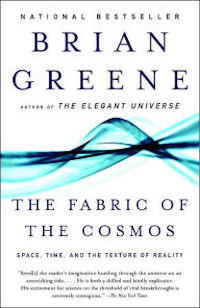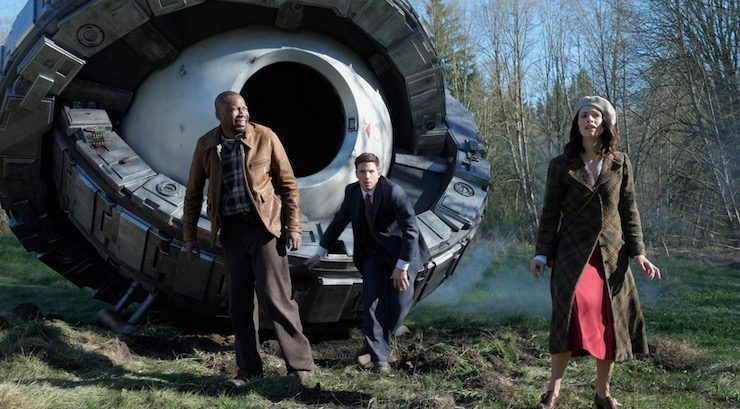I’ll admit that I didn’t expect much when I started watching the first half of the season of Timeless. The promos, with their swelling music, seemed a bit hokey and overly dramatic, and I wasn’t sold on the time travel premise. But then I actually sat down with the show, and found that not only was it enjoyable, but that I genuinely liked it. The leads are compelling, the mystery is intriguing, and it doesn’t take itself too seriously. Long story short, if you haven’t given this show a chance but you like fun, give it a try.
The scientific explanation of time travel in the show gets one sentence from character Connor Mason: “If you get a powerful enough gravitational field, you can actually bend space-time back on itself in a kind of loop, a closed time-like curve that would allow you to cross over to an earlier point.” There are certain rules within the show: only travel to the past is allowed, and only to periods before the time travelers’ births. And the characters have the ability to change the past, but they shouldn’t. That’s what main character and historian Lucy Preston is there to ensure.
The beauty of this show is in its simplicity: the creators and writers simply aren’t interested in digging too deep into the science because, at its core, it’s an adventure show. But I’m here to ruin the fun by asking: Is the time travel in Timeless actually possible?
Let’s rewind and pose a simpler question: Is time travel possible? We turn to Brian Greene’s The Fabric of the Cosmos: Space, Time, and the Texture of Reality, which breaks the stuff of our universe down to its most basic questions: What is space? What is time?
To understand whether time travel is possible, we need to understand the nature of time itself. Experience, and what we see in the world, tells us that time has different characteristics (the past is different than the future, because the past has already happened and the future has not), and that time is like an arrow: it moves in one direction. However, that is biased by our own perceptions and worldview; Einstein’s theory of relativity tells us that every moment is the same. Time does not flow. There is no past, present, and future. There just is. Just because we perceive time a certain way doesn’t mean it actually is that way.
Quantum mechanics adds some layers and complications to this, but let’s leave that for now. If time just is, then can we move backward and forward through it? Is time travel even possible?
Most scientists would agree that no, you cannot travel in time. But, technically, physics doesn’t say it’s a no go. There’s nothing that we’ve discovered that tells us time travel is strictly impossible. The question really isn’t whether it’s possible: it’s what you can do with it.
The premise of Timeless is that a man named Garcia Flynn (played oh so well by ER’s Goran Višnjić) has stolen a time ship and is traveling to pivotal points in American history to change the outcome. Our intrepid team is tasked with stopping him, and while they succeed for the most part, they’re not always entirely successful. This means they sometimes come back to a changed present, where only those within the time ships (Flynn and his team, and Lucy and hers) can remember events as they were. In other words, they are changing past events. Changing the timeline.
Traditional physics tells us that this is, quite simply, impossible. Every moment happened as it happened. Every moment will happen as it will happen. There is no concept of human free will factored in; it is how it is and will be how it will be (except time is relative, and past, present, and future are subjective, so technically it just is how it is. There’s no “will be” in relativistic physics.) If you travel back in time and are present at certain events, you were always there. That event never unfolded in a way in which you weren’t there. There are no paradoxes; you can’t travel back in time and murder your own grandfather, unless in your memory, your grandfather was murdered by someone who looked a lot like you do. Period. End of story.
 Quantum mechanics, however, tells us something different: as a science fiction fan, you’re probably familiar with the Many Worlds theory (even if you don’t know it by that name). The bottom line is that every potential outcome of any situation—every single one—actually occurs in a parallel universe. So while the events in the timeline of your universe are static, you have the ability to change the events in the past, but you do so not just by traveling in time. According to this theory, the characters in Timeless are actually jumping to alternate parallel universes.
Quantum mechanics, however, tells us something different: as a science fiction fan, you’re probably familiar with the Many Worlds theory (even if you don’t know it by that name). The bottom line is that every potential outcome of any situation—every single one—actually occurs in a parallel universe. So while the events in the timeline of your universe are static, you have the ability to change the events in the past, but you do so not just by traveling in time. According to this theory, the characters in Timeless are actually jumping to alternate parallel universes.
While I highly doubt that the creators of Timeless are going to rename the show Alternate Parallel Universe-less, it’s a fun possibility to think about. We don’t know that time travel is an impossibility when it comes to physics, nor do we know the rules that would govern such an endeavor. If you’re interested in learning more about the nature of time, space, and our reality, Brian Greene’s The Fabric of the Cosmos is an excellent place to start.
Swapna Krishna is a freelance writer, editor, and giant space and sci-fi geek. You can find her on Twitter at @skrishna.











Remember Primer? I love Primer.
I like to recall T’Pol’s line in Enterprise about how the Vulcan Science Academy has, with mathematical certainty, ruled time travel impossible.
What caught me about Timeless, is that the heroes essentially fail at their task to prevent a change to history each week. They mostly keep history the same – but only mostly – and their failure creates a big change for one hero in the premiere. That said I’ve found the individual plots / episodes basic action adventure and not worth my time. I’ve only stuck around to find out if the big time travel story arc fulfills the promise. I’m not sure that I have to patience to keep watching, though.
I think I’d love to read this as a novel where they focus on the the science of time travel and skip the adventures in the past.
This show is the update to Quantum Leap? Only without ending up in other people’s body (which I always found creepy in QL, especially the episodes where Sam had sex) but still trying to put right what someone put wrong? From what I understand they are just trying to Make America Great Again and the bad guy is trying to Make America Humble Again? I want the bad guy to win, sounds like they have better life goals.
Oh, and Time Travel? Timey-wimey, wibbly-wobbly, who knows if it is possible.
@@.-@ No, the “bad guys” are trying to stop the Riddenhouse Group who have been a political/financial conspiracy controlling American politics since the Revolutionary War. The main bad guy Flynn blames them for the murder of his wife and kids so he’s trying to stamp them out throughout American history so his family won’t be dead.
The good guys have moved through the first season with the idea that Flynn and friends are evil because they are messing with history and aren’t afraid to murder on a huge scale such as blowing up the Hiddenburg and assassinating Lincoln to do it, but they have learned Flynn’s true motivation and that Riddenhouse is trying to pull their strings through surveillance and forcing one of their team to spy for them.
It’s up in the air where the show’s good guys will go from here, but they definitely won’t agree to wholesale slaughter.
The time travel portrayed in the show is rather straightforward from an SF perspective. I originally had high hopes for Timeless, as the old Time Tunnel show was a favorite of both mine and my wife’s when we were young. But the new show has an unrelenting grimness to it. Everyone is flawed, keeping secrets, being threatened, being manipulated. And when they do go into the past, it seems that most of the action is devoted to struggling with their time traveling rivals rather than interacting with the people from the past. We gave up on it after about 4 or 5 episodes.
I started watching this. I like time travel narratives.
However, they turn up at the Alamo. Evidently their history is already different to ours, because all the myths about Davy Crockett were preserved and it was still seen as this big heroic thing [hint; it wasn’t].
**
Sam Beckett only had sex..twice whist Leaping. As far as memory serves. That’s not a lot :-)
There is no such thing as time. It’s a “social construct” not a magical highway.
What a load of twaddle. If you got that from Greene, then he was smoking crack when he wrote it.
1. Relativity does not tell us that time just is or that it doesn’t flow. Relativity does not, in point of fact, tell us much at all about the fundamental nature of time, just how different observers perceive it to pass.
2. Quantum approaches to gravity, other than string theory, certainly do raise significant questions about the nature of time, including whether it even really exists, or is just an emergent phenomenon. But in the absence of a quantum theory of gravity, there are no answers to these questions yet. And Greene, as a proponent of string theory, must know that string theory avoids the problem altogether by assuming a smooth background.
3. “There’s nothing that we’ve discovered that tells us time travel is strictly impossible. ” Strictly speaking, true, but very deceptive. To construct a closed timelike loop requires violating the weak energy condition. The weak energy condition isn’t weak because it is feeble. It is weak because it is the loosest, most flexible possible constraint on the energy of a matter field. Basically, it requires the energy density to be positive. While there is no proof of negative energy densities being impossible, there are exactly zero possibilities in the Standard Model and the universe would be a very strange place indeed if such fields were to exist. So the truth is it is very very very very very very likely to be impossible.
4. “There’s no “will be” in relativistic physics.” Yes there is. What you’re saying is there is no causality and that is total bullshit.
5. Quantum mechanics won’t save you. There are quantum time machines but they operate only in a region of space cut off from everything else. As soon as you step out, you’re back in your own time. And Many Worlds is not a theory, it is an interpretation of a theory. It is not the only interpretation of that theory and it is by far not the most popular among physicists.
Greene is ok but he is not an oracle. And his addiction to string theory colors everything he writes. You could equally well read Lee Smolin or Julian Barbour. In fact, you’d probably be better off.
I am a history crusher:)